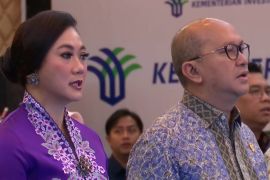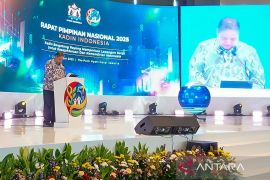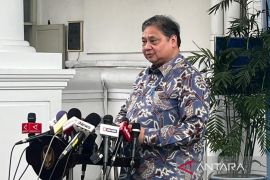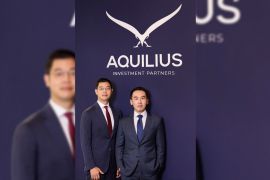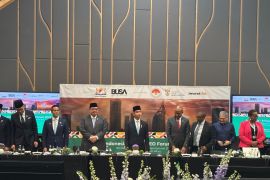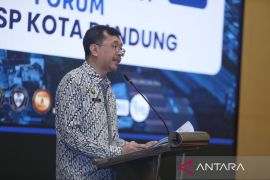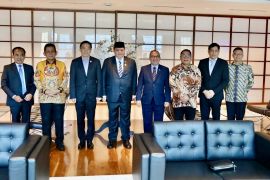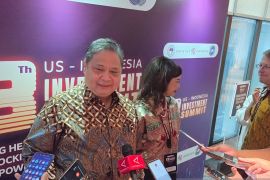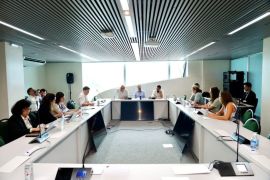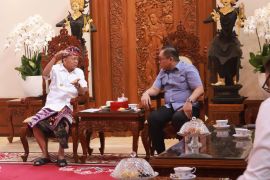In announcing these opportunities, Ambassador of Sudan to Indonesia Abd Alrahim Alsiddig Mohamed Omer said here on Saturday, "But there are other areas to consider, such as thermal power generation, hydro-power generation and renewable resources, such as solar energy and wind power."
He made the remarks at a forum held by the Indonesian Muslim Journalists Association (PJMI).
PJMI, in collaboration with the Center for Southeast Asian Studies (CSEAS) Indonesia - State Islamic University Syarif Hidayatullah, held a Ramadan Dialogue Series entitled, "Current Economic and Social Development in Africa" with ambassadors from Africa, including Sudan.
Some officials from the Center of Policy Analysis and Development for Asia-Africa and African Regions, including Dr. Arisman, Executive Director of CSEAS Indonesia and Mohammad Anthoni, Chairman of PJMI, along with university students, attended the forum.
He said, further, that the governments National Energy Plan calls for expansion of the countrys power generation capacity.
In other words, Sudan needs more power plants. As such, the government has invited investors to set up independent power producers.
Indonesia state-owned oil and gas company Pertamina and private company Medco Energi International are conducting oil exploration in Sudan.
According to the Ambassador from Sudan, Sudan, the second largest country, occupying eight percent of the African continent, is the hub for investment.
Its immediate neighbours are Egypt, Libya, Chad, Central African Republic, the Republic of South Sudan, Ethiopia and Eritrea. It has a 875 kilometer coastline on the Red Sea, across from another neighbour, Saudi Arabia. With the huge oil reserves, investors in this sector are assured of significant profit margins.
"We also offer investors a wide range of opportunities in agriculture, agro-manufacturing, mining, livestock, tourism and other services, along with very attractive incentives, such as exemptions from business taxes ranging from 3-10 years, according to the size of the investment," he said, adding that the amended act of investment of 2013 is even more flexible and accepted by investors.
Ambassador Abd Alrahim said Indonesian private sectors need to be encouraged to do do business in Sudan.
"They can choose where to go, as Sudan is the hub for investment," he said.
The ambassador said that China, firstly, chose Sudan for investment and began to invest in the information technology sector in the 1990s.
"Now its companies have invested in many parts of Africa and Malaysia, also beginning in Sudan," he added.
Leading companies from China, Malaysia, Japan, Canada, Sweden, Australia, France, the United Kingdom, Russia, Turkey and many other countries are now actively engaged in diverse and profitable business ventures in Sudan, he added.
In todays contemporary world, Africa is seen as the continent that possesses enormous potentials, and Indonesia needs to position itself to take advantage of the opportunities afforded by African economies. For Indonesia, Africa is a non-traditional market.
Indonesian foreign policy towards Africa is consistent, and Indonesia is determined to continue building a new, constructive and deeper partnership with Africa.
The relation between Indonesia and Africa has been growing over the past years. In terms of trade, the Indonesia-Africas trade volume reached US$11.3 billion in 2012, more than twice as much as in 2009 (US$4.77 billion), while Indonesias export to Africa in 2012 increased by 46 percent, compares to the year 2011.
As opposed to Africas main trading partners, such as China (US$139.5 billion), USA (US$125.57 billion) and India (US$55.29 billion) in 2011, Indonesia lags far behind. This is the challenge for Indonesia to exert more efforts to tap the huge potential for mutually beneficial relations.
Sudan is now brimming with investment opportunities. They are everywhere and on every scale, rich in natural resources, and strategically located. The countrys natural resources also include large deposits of petroleum and minerals.
Trade relations between Indonesia and Sudan are part of Indonesias efforts for expanding its non-traditional export markets to Africa.
The main non-oil/gas export commodities of Indonesia to Sudan include writing paper, car batteries, cement, electronic accumulators and garments. Meanwhile, Indonesias main import commodities from Sudan include petroleum oil and cotton.
Bilateral relations
Indonesia and Sudan have enjoyed the steady growth of cordial and friendly relations since the two countries established diplomatic relations in 1960, when it marked the opening of the Indonesian embassy in Khartoum.
However, in 1967 the Indonesian embassy was closed because of financial restraints and re-opened several years later. The embassy of Sudan in Jakarta was officially opened in January 24, 1993.
As developing nations, Indonesia and Sudan collaborate in multilateral forums, such as the United Nations, the Non-Aligned Movement, G-77, the Organization of Islamic Conference and the South-South Cooperation.
Economic cooperation between Indonesia and Sudan was carried out on the agreements that were signed at the Joint Commission Meeting between Indonesia and Sudan in February 1988 in Khartoum.
The agreements covered Trade Agreement, Avoidance of Double Taxation, Promotion and Protection of Investments and other MOUs related to cooperation in the sectors of tourism, telecommunication, agriculture and fisheries.
The excellent relations are reflected in the increasing exchange of visits between dignitaries, including high-ranking government officials and parliamentarians, as well as the private sectors of the two countries.
"In the private sectors, the flow of traders from Sudan to Indonesia keeps increasing. And it is expected that the number of Indonesian business people to visit Sudan will also increase," predicted Ambassador Abd Alrahim.
(T.M016/INE/B003)
(T.M016/A/KR-BSR/B003)
Reporter: Mohammad Anthoni
Editor: Aditia Maruli Radja
Copyright © ANTARA 2014
